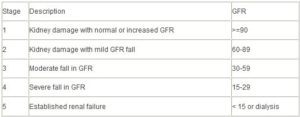Chronic kidney disease (CKD) is characterized by a gradual loss of kidney function over time. It includes conditions that damage your kidneys and decrease their ability to keep you healthy. If kidney disease gets worse,wastes may build up in your blood and make you feel sick. You can develop complications like high blood pressure, anemia (low blood count), weak bones, poor nutritional health and nerve damage. Also, kidney disease increases your risk of having heart and blood vessel disease. These problems may happen slowly over a long period of time.

Five stages of CKD
Based on glomerular filtration (GFR),CKD can be divided into five stages, as the following table.
ckd gfr
What are the causes of CKD?
Diabetes and high blood pressure are two main causes for CKD. Up to two-thirds of the CKD cases are caused by these two conditions. Other conditions that affect the kidneys are:
Glomerulonephritis, a group of diseases that cause inflammation and damage to the kidney’s filtering units. These disorders are the third most common type of kidney disease.
Inherited diseases, such as polycystic kidney disease, which causes large cysts to form in the kidneys and damage the surrounding tissue.
Malformations that occur as a baby develops in its mother’s womb. For example, a narrowing may occur that prevents normal outflow of urine and causes urine to flow back up to the kidney. This causes infections and may damage the kidneys.
Lupus and other diseases that affect the body’s immune system.
Obstructions caused by problems like kidney stones, tumors or an enlarged prostate gland in men.
Repeated urinary infections
What are the symptoms of CKD?
Most people may not have any severe symptoms until their kidney disease is advanced. However, you may notice that you:
feel more tired and have less energy
have trouble concentrating
have a poor appetite
have trouble sleeping
have muscle cramping at night
have swollen feet and ankles
have puffiness around your eyes, especially in the morning
have dry, itchy skin
need to urinate more often, especially at night.
Treatments of CKD
A variety of diseases and conditions can cause CKD.The treatment options for CKD in our hospital are:
Symptomatic treatment
Conventional treatment mainly aims at controlling the symptoms like high blood pressure,anemia,swelling etc in CKD. Medications for blood pressure,diuretics, erythropoietin are major medication procedures for CKD. But these treatments failed to cure the root causes of the disease.
Superfine Chinese Medicine Osmotherapy
Chinese Medicine Osmotherapy is an external therapy based on traditional Chinese medicine.Different formulas are prescribed based on the CKD stage,kidney damage degree and causes of CKD.The Chinese medicines can be penetrated into kidney lesions directly with the help of osmosis devices.This therapy aims at restoring the impaired kidney structure and enhancing renal function.
Immunotherapy
Immunotherapy can treat CKD by correcting the immune dysfunction and recovering the self-healing system in body.Once the impaired kidney tissues can be regenerated, the kidneys will be able to function better.
Blood Detoxifying and Function Rebuilding Therapy
In treating CKD, Blood Detoxifying and Function Rebuilding Therapy starts from treating unhealthy blood instead of the the kidneys. Blood Detoxifying and Function Rebuilding Therapy has three treatment processes, each of which plays a vital role in treating CKD. These three treatment processes include combined therapy of blood purification, elements supplementation and function rebuilding.
Medicated bath
In CKD, as kidneys are damaged, high levels of toxins and wastes will build up in body and blood supply to kidneys will reduce. Medicated bath is an external therapy for CKD.When soaked in bath, your sweat pore will open up. some wastes and toxins will be filtered out of body through the pores, while some effective medicine ingredients can enter body through the open pores.
Kidney replacement treatments
When CKD develops into advanced stage, kidney replacement treatments will be required including dialysis and kidney transplant.